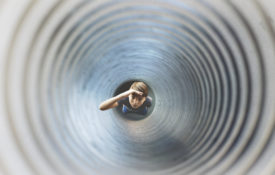-

Friend and Foe: How Inflammation Fights Disease and Fuels Depression
Our immune system uses inflammation to fend off infection and heal injuries, but when this system is overburdened, inflammation can also fuel mental health conditions.
-

Back Page: Singular Sensation
Clinical psychologist Dominika Ochnik discusses her research into singlehood and well-being, mental health risks among young people, and her plans to study associations between urbanization and mental health.
-

Presenting Information About Mental Health in a Second Language Could Help Counter Cultural Norms Against Treatment
Bilingual people from cultural backgrounds in which mental health is a taboo topic may be more open to treatment when they hear information in their second language.
-

New Content From Perspectives on Psychological Science
A sample of articles on assessing and mitigating bias in AI applications for mental health, investigating coping vs. thriving, exploring mnemicity attribution as a cognitive gadget, and much more.
-

The May/June Observer: Informing Public Health Through Psychological Science
From pandemics to poverty, from mental illness to science denial, sweeping public health challenges have engulfed the world. Psychological science could improve outcomes for millions.
-

Lived Experiences Can Be a Strength. So Why the Bias Against “Me-Search”?
Podcast: Questions often emerge when researchers tend to engage in research on topics that are personally relevant for them. How is this type of self-relevant researchperceived? Researcher Andrew Devendorf discusses.

